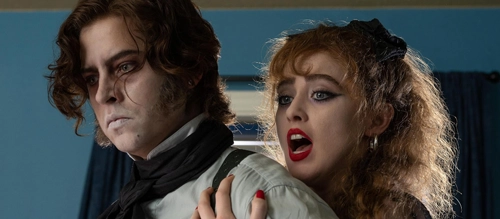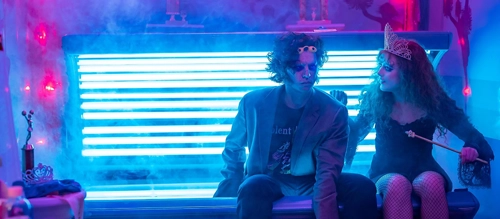Lisa Frankenstein (2024) Review

Lisa Frankenstein (2024)
Director: Zelda Williams
Screenwriter: Diablo Cody
Starring: Kathryn Newton, Cole Sprouse, Liza Soberano, Joe Chrest, and Carla Gugino
Mary Shelley spent a lot of her time in cemeteries. As writer Bess Lovejoy explained in her 2018 article for JSTOR Daily, Shelley would often take walks through the St. Pancras churchyard and visit the grave of her mother, writer and women’s right advocate, Mary Wollstonecraft. When she was 16, Shelley would sneak off to the cemetery with her future husband, the poet Percy Shelley, and, as tradition would have it, they made love together for the first time among the tombstones.
“Literary, familial, and carnal knowledge were all bound together in one place,” Lovejoy wrote.
It is fitting, then, that Lisa Frankenstein, the film bearing the name of Shelley’s 19th century literary masterpiece, often considered the first science fiction novel, begins inside a lush, green cemetery called Bachelor’s Grove, overgrown with veins and forgotten by time. The camera slowly pushes in toward a young girl, seen from behind, her hair wild and frizzy, tracing Frankenstein, which is engraved on the tombstone, onto a sheet of paper. Above it, she quickly scrolls in cursive her name, Lisa, in pink lipstick.
Lisa Frankenstein, written by Diablo Cody and directed by Zelda Williams, daughter of the late Robin Williams, in her directorial debut, is an amalgamation of quirky 80s teen comedies and gothic horror, resulting in a movie that is heavy on aesthetics but lacking in a coherent tone and narrative. Starring Kathryn Newton (Ant-Man and the Wasp: Quantumania) in the titular role and Cole Sprouse (recently freed from the shackles of CW’s ‘Riverdale’) as the creature she creates, Lisa Frankenstein is part romance, part body horror, part 80s teen comedy, that delights in playing with the genres it is heavily influenced by, but stops short of saying much about them.
Lisa Swallows is your typical weirdo outcast who is forced to relocate to a new town in her senior year of high school following the death of her mother at the hands of an axe murderer. Lisa’s well-meaning but oblivious father, Dale (Joe Chrest), has just married Janet (Carla Gugino), a neurotic psychiatric nurse, who spends her free time cleaning her spotless house while sipping martinis and listening to motivational cassette tapes on her Walkman, who seems to think it’s high time Lisa just gets over her grief and moves on. Even though her step-sister Taffy (Liza Soberano), who is somehow both nice and extremely popular, tries to make Lisa feel like part of the family, Lisa still feels misunderstood – an outsider who watches silent movies and writes depressing, cerebral poetry and hangs out in cemeteries, where she often recounts her troubles to the tombstone of a nameless, yet handsome young man who died in the 19th century. When a freak lightening storm reanimates his corpse, Lisa finds she feels more alive than ever – even if that means hacking off the body parts of her enemies to make her creature whole again.
Lisa Frankenstein is a love letter to the gothic in all its many forms, from the origins of gothic romance and horror in the 19th century to the subculture that emerged in the late 80s, and everything in between. One of the most visually interesting sequences in the film is an homage to George Melies’ 1902 silent film, A Trip to the Moon, which is itself one of the earliest science fiction films. The silent era in general, particularly star Theda Bara, had a lot of influence on the goth subculture of the 80s so its inclusion is a nice acknowledgement of the culture’s roots. Maegan McLaughin Luster’s costume design is equally of note, with obvious references to Madonna and 80s classics like Heathers and Beetlejuice. The costuming feels authentic to the time period, but also does a really great job of capturing, visually, Lisa’s inner transformation as she overcomes her fears of death and embraces it, with a gradual shift from a more conventional style to the epitome of 80s goth fashion, clad in black lace, dark rimmed eyes and red lipstick. The production design is heavily stylized and detailed, making the interiors of Janet’s pastel hued home and Lisa’s bedroom feel both lived in and carefully curated.

While the look of the film is solid, the tone and overall narrative is, at times, inconsistent.
Lisa Frankenstien marks Diablo Cody’s return to genre filmmaking following the middling release of Jennifer’s Body 15 years ago. The film was eviscerated by critics when it first came out, but is now held up as a feminist cult classic, a sharp satire about the horrors of growing up as a woman and the intense, psychosexual nature of female friendship. Lisa Frankenstein, by comparison, isn’t interested in satire or even being especially scary or disturbing. The more macabre elements of gothic horror take a backseat in favor of a far more straightforward, light-hearted approach. The movie isn’t really interested in subverting genre tropes either, which is something that made Jennifer’s Body so compelling and funny. The closest it gets to commenting on anything is when Doug, who represents your typical nerdy guy of the 80s, usually played by Anthony Michael Hall, doesn’t get the girl in the end ala Sixteen Candles. While it’s easy to see the obvious influences of 80s teen comedies and slasher films in Lisa Frankenstien, its main influence is Heathers, the 1988 dark comedy starring Winona Ryder and Christian Slater. Lisa herself feels like a combination of several of Ryder’s iconic roles. It’s an odd choice, though, because the film doesn’t have the layers of Heathers nor the biting social satire. It doesn’t exist in the same horrifying dreamscape. Actually, the world itself feels underdeveloped and not fully realized. We don’t see much of the world outside of Lisa’s house and we don’t fully explore how that world interacts with her. Because of that, the tone feels uneven and the pacing is off, sometimes. Scenes move too slowly, linger too long. The script itself is really funny and Newton sells a lot of the humor, but the energy in some scenes doesn’t match the content.
At the end of the day, Lisa Frankenstein is a romance, a fantasy about finding someone who actually listens to you, and it’s in exploring the central relationship that the film transcends its flaws. Kathryn Newton is an absolute knockout in this movie. She goes from being meek and lost in grief to exhilarated by love and drunk with her newfound power of giving life to her perfect man. Newton plays Lisa as being awkward and slightly unhinged, turned on by The Creature’s murderous devotion to her.
One of the highlights of the movie is when The Creature plays a piano version of REO Speedwagon’s “Can’t Fight this Feeling.” Lisa sings along and dances around the living room, finally free from darkness of grief – finally letting go. It’s really touching and Newton completely sells it. Sprouse does a serviceable job as The Creature, who doesn’t utter a single word, although he seems more inclined to let Newton have the spotlight. Heavily done up in prosthetics in the beginning of the film as a decayed corpse, Sprouse is best when he’s forced to use his entire body in his performance – when his movements and expressions can be exaggerated. As The Creature begins to look more alive and human, thanks to a handy tanning bed that is constantly short circuiting, Sprouse struggles with micro expressions like he’s holding back, choosing to do not very much at all for fear of acting too big. Williams’ camera doesn’t help matters because she rarely cuts close enough to his face too catch the subtleties of his expressions.
While Lisa and The Creature’s relationship is believable, it is entirely too chaste for a film where body parts are getting hacked off left and right. The film would have benefitted from having an R rating like Jennifer’s Body considering the MPAA is as reluctant as ever to allow anything too erotic and sensual onscreen in a PG-13 rating. While it’s perfectly acceptable to see someone’s arm get lopped off, a scene where The Creature uses Lisa’s vibrator on her had to be implied off-screen. Murder is perfectly fine, but we apparently have to draw the line at female pleasure.
Lisa Frankenstein is a celebration of love and death and all the ways they’re inextricably linked. Its tone is uneven and some of the horror elements may leave you shaking your head, unable to parse exactly how you’re supposed to feel about it all. But, led by a magnetic performance by Kathryn Newton, Lisa Frankenstein is a fun, cosmic ride through nostalgic 80s pop culture and will surely make every recovering teenage weirdo feel seen.
Score: 13/24

